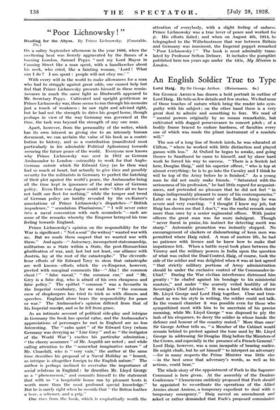" Poor Lichnowsky ! "
Heading for the Abyss. By Prince Lichnowsky. (Constable. 25s.)
ON a sultry September afternoon in the year 1666, when the sweltering heat was fiercely aggravated by the flames of a burning London, Samuel Pepys " met my Lord Mayor in Canning Street like a man spent, with a handkercher about his neck, who cried, like a fainting woman, ' Lord ! What can I do ? I am spent : people will not obey me.' "
With every will in the world to make allowances for a man who had to struggle against great odds, one cannot help but feel that Prince Lichnowsky presents himself in these remin- iscences in much the same light as Bludworth appeared to Mr. Secretary Pepys. Cultivated and upright gentleman as Prince Lichnowsky was, there seems to run through his memoirs just a touch of weakness : he saw right and advised right, but he had not the strength to drive his gospel home, though perhaps in view of the way Germany was governed at the time, the task was beyond the strength of any one man.
Apart, however, from the personality of the writer, which has its own interest as giving rise to an intensely human document, we can acclaim the value of his book as a contri- bution to history, and as a contribution (manifested most particularly in his admirable Political Aphorisms) towards securing the future peace of the world. Everyone now knows why Prince Lichnowsky was sent in 1912 as German Ambassador to London—ostensibly to work for that Anglo- German entente which Sir Edward Grey (as he then was) had so much at heart, but actually to give time and possibly security for the militarists in Germany to perfect the hatching of their plot against the world's peace, the Ambassador being all the time kept in ignorance of the real aims of German policy. Even Herr von Jagow could write "After all we have not built our fleet for nothing," while the temper and trend of German policy are luridly revealed by the ex-Kaiser's annotations of Prince Lichnowsky's dispatches—" British impudence," " scandalous Pharisaisms," " I will never enter into a naval convention with such scoundrels "—such are some of the remarks whereby the Emperor betrayed his true feeling towards England.
Prince Lichnowsky's opinion on the responsibility for the War is significant : " Not a soul " (he writes) " wanted war with us. But we made them suspect that we wanted war with them." And again—" Autocracy, incompetent statesmanship, militarism as a State within a State, the post-Bismarckian glorification of war, and, last but not least, our alliance with Austria, lay at the root of the catastrophe." The eleventh- hour efforts of Sir Edward trey to stem that catastrophe are well known—efforts which the ex-Emperor, however, greeted with marginal comments like—" Aha ! the common cheat ! " " false rascal," " the common cur," and " Mr, Grey is a false dog, who is afraid of his own cheapness and false policy." The epithet " common " was a favourite in the Imperial vocabulary, for we read how " the common crew of shopkeepers has tried to trick us with dinners and speeches. England alone bears the responsibility for peace or war." The Ambassador's opinion differed from that of his Imperial mastIr, and so he fell from grace.
As an intimate account of political side-play and intrigue in Germany the book has special value, and the Ambassador's appreciations of personages he met in England are no less interesting. The " calm quiet " of Sir Edward Grey (whom Germany was decrying as " Liar Grey " and as " the instigator of the World War ") excites his particular admiration ;
the cheery assurance " of Mr. Asquith are noted ; and while calling attention to the " somewhat imaginative nature " of Mr. Churchill, who is " very vain," the author at the same time describes his proposal of a Naval Holiday as " honest, as intrigue is altogether foreign to the English nature." The author is perhaps inclined to overvalue the importance of social relations in England he describes Mr. Lloyd George as a " phenomenon," and commits himself to the statement that with us a hospitable house run by pleasant hosts is worth more than the most profound special knowledge.' But he is surely right when he records that “ the Briton loathes a bore, a schemer, and a prig."
One rises from the book, which is emphatically worth the
attention of everybody, with a slight feeling of sadness, Prince Lichnowsky was a true lover of peace and worked for it. His efforts failed ; and when on August 4th, 1914, he telegraphed to the Wilhelmstrasse that war between Britain and Germany was imminent, the Imperial puppet remarked `` Poor Liehnowsky ! " The book is most admirably trans- lated by Professor Sefton Delmer. It includes the pamphlet published here ten years ago under the title, My Mission to London.




































 Previous page
Previous page